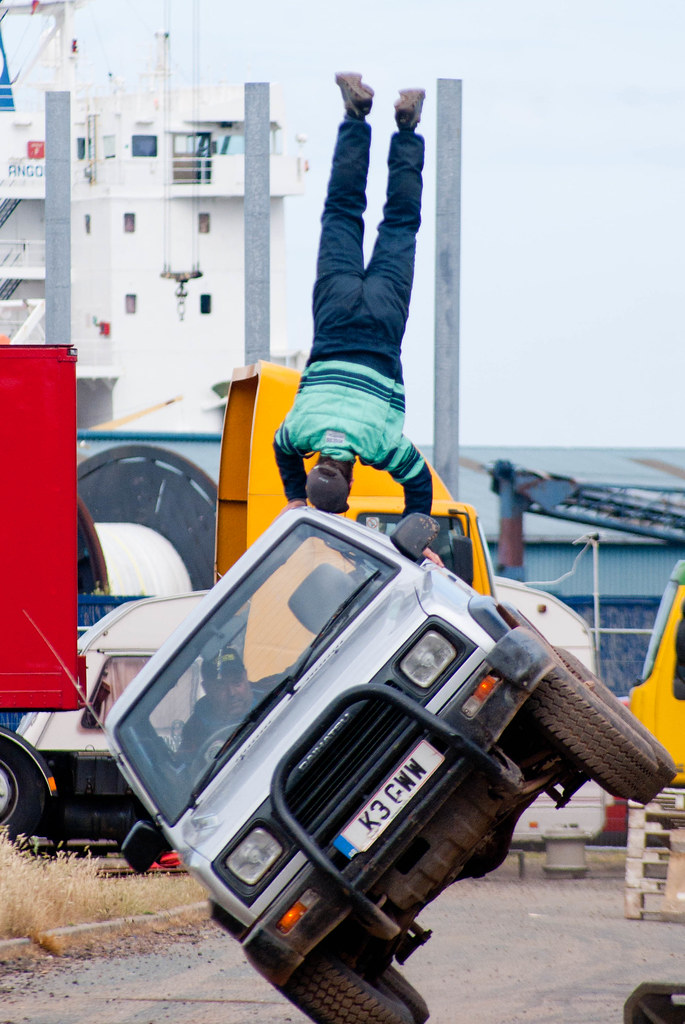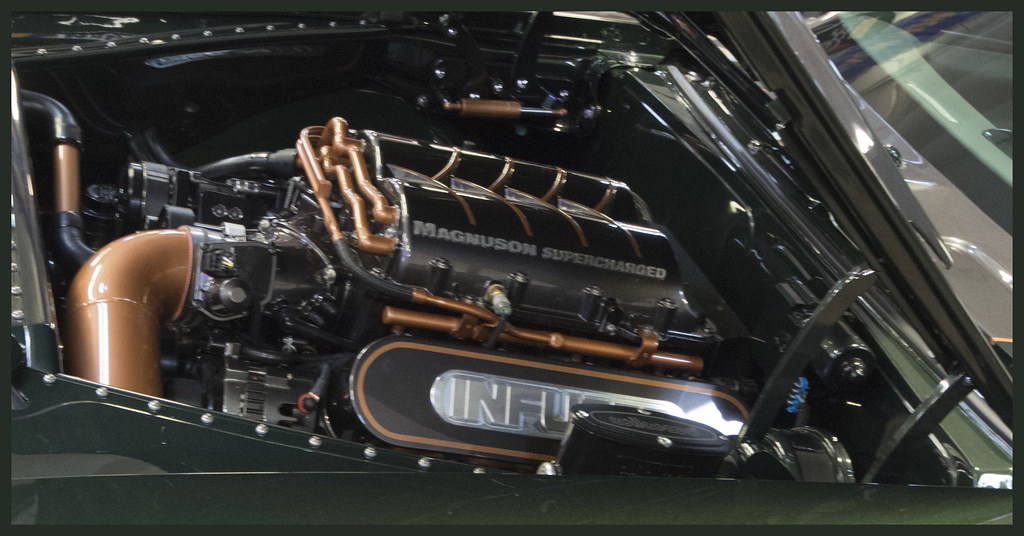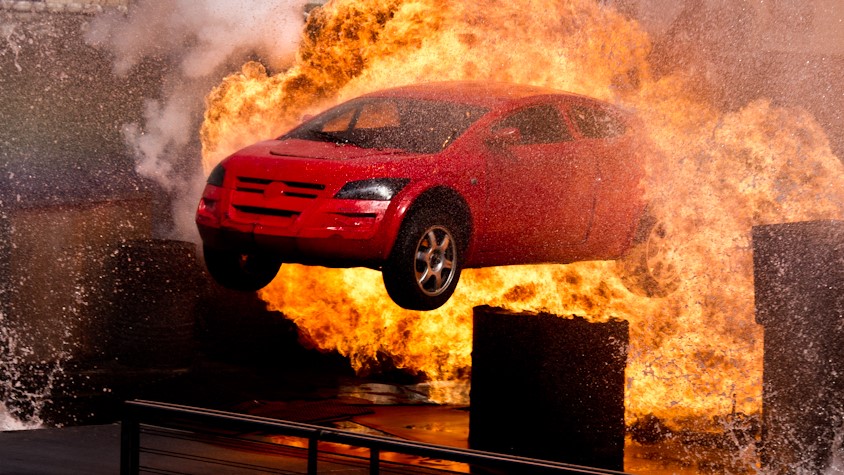Maneuvers
Sure, cars are great for traveling from point A to point B fairly quickly. But half the fun of vehicles in a TTRPG is being able to pull off the stunts we see in action films. These are the elements that make a chase more exciting and pulling off the right maneuver at the right time makes a scene more memorable. For that, we have specific maneuvers. Unless it is listed otherwise, all of these maneuvers will require at least trained in Pilot.
The difficulty for driving maneuvers is affected by the speed of the vehicle. DC’s increased by +1 for every speed of above 4. So, pulling a drift at speed 5 adds +1 to DC, pulling a Pit Maneuver at Speed 8 adds +4 to the DC.
Basic rules for Vehicles they can be found here
Bootleg Turn
[one-action]
This is classic move allows you change the direction you are heading without moving through other hexes. This Maneuver happens in the hex you are when you try the maneuver.
You make a free turn, unlimited by your normal maneuverability. The DC depends on how many faces you wish to change. You must declare which you are rolling for ahead of time. DC 15 Pilot check allows for turning one hex face. DC 18 Pilot Check allows for turning two hex faces. DC 22 Pilot check is a full 180° turn.
Dead Stop
[two actions]
Instead of decreasing slowly and moving half the speed you moved last turn, you can come to a dead stop and move no hexes this turn. The DC is 20 + double the speed modifier. So, dead stopping from a speed of 6 is DC 24
Success: You safely stop in the hex you are currently in.
Failure: The vehicle stops as per the normal rules for stopping, moving half the hexes it moved last round.
Critical Failure. You move half the hexes you moved last round and are Out of Control.
Drift
[one-action]
You are able to turn the vehicle faster than its normal maneuverability allows. A Pilot Check DC 20 allows you to make a turn as if your maneuverability was one better. So if you normally require two hexes of forward travel to make a turn, Drifting means you only need 1. Drifting does cause a speed loss of 1. If you were going 6 hexes when you drift, you can only go 5, and so on.
Critical Success: You Drift with no speed loss
Success: You Drift as described.
Failure: You turn as normal
Critical Failure: You turn as normal but still suffer the speed loss.
Pit Maneuver
[one-action]
The maneuver made famous by police all over the United States. It is used to bring another vehicle to a complete stop. You position your vehicle to the side and rear of another vehicle then nudge them, causing them to spin out and both vehicles come to a stop.
Both vehicles take half the damage they would for a normal collision.
A Pilot Check is rolled against the opponents Pilot DC. The opposing driver gets a bonus or negative to their Pilot DC based on size difference of vehicle. Increase or decrease the DC by +2 for each category larger the opposing vehicle is. So, a Large Sedan trying a Pit Maneuver against a Huge SUV, the DC is 10+SUV Pilot skill+2
Critical Success: You stop both vehicles. The opposing vehicles takes half damage, and you take none.
Success: You stop both vehicles and both take half damage for a normal collision.
Failure: You damage the vehicles, but do not stop them.
Critical Failure. You deal no damage and must make a Reflex save or become Out of Control

Ski
[one-action]
Expert proficiency required
Skiing is a nickname given to riding a four wheeled vehicle on two wheels. While this stunt is mostly for showing off, it can be used for practical matters.
A DC 30 Pilot Check allows you to avoid some hazards without changing directions or losing speed. It also allows the vehicle to fit down some corridors it would otherwise not be able to.
Vehicle Rules quick overview.
Maneuverability is the number of hexes a vehicle must travel before it can turn again.
Speed is average cruising speed for a vehicle — in other words, how fast it can go without being pushed — with its top possible speed in parentheses. A speed of 7(10) means it can cruise at up to 7 hexes and can be pushed to 10 hexes per round.
If a Vehicle is broken but still operable, it’s Maneuverability is 1 worse, cruise speed is lowered by 1 and its top speed is lowered by 2.
| Vehicle | Hardness | HP | Maneuverability | Collision Damage | Speed | Price* | Size |
|---|---|---|---|---|---|---|---|
| Dirt Bike | 5 | 20 | Good (1) | 2d6 | 4(7) | 10gp | Medium |
| Motorcycle | 7 | 32 | Average (2) | 2d6 | 6(10) | 20gp | Medium |
| Sedan | 9 | 42 | Average (2) | 2d10 | 6(9) | 25gp | Large |
| SUV | 10 | 48 | Average (2) | 3d10 | 6(9) | 30gp | Huge |
| Pickup Truck | 12 | 55 | Average (2) | 3d10 | 5(8) | 30gp | Huge |
| Bus | 14 | 66 | Poor (3) | 5d8 | 5(7) | 40gp | Gargantuan |
| Tractor Trailer | 18 | 80 | Poor (3) | 6d8 | 5(7) | 50gp | Gargantuan |
| Sports car | 9 | 42 | Good (1) | 2d10 | 7(10) | 100gp | Large |
*These prices represent how much it costs to obtain a vehicle. While some may certainly have higher costs, this is the minimum required deposit to get ownership of a vehicle (whether that represents buy a used older version or a down payment at dealership with a loan). Vehicles can be rented for 10% of their listed cost per day
Vehicle Upgrades

Upgrades can either be included at the time of purchase or added on later. Vehicles have a limit on the amount of upgrades they can have based on their size. A medium vehicle can have 3 upgrades, large can have 4, Huge can have 5, Gargantuan can have 6, and so on.
Speed Upgrade
The cost of a speed upgrade is dependent on the vehicle. It costs double the cost of the vehicle it is added on to. A Speed upgrade adds 1 to each speed category — a speed upgraded sedan would be 7(10).
Maneuverability Upgrade
The cost of a maneuverability upgrade is dependent on the vehicle. It costs double the cost of the vehicle it is added on to. A maneuverability upgrade improves a maneuverability category by 1. Vehicles can never improve beyond Perfect (0).
Armor
Armor, such as steel plating, bullet proof panels, etc., add to a vehicles Hardness. Each upgrade costs 10gp and adds +2 hardness.
Sturdiness
This upgrade makes a vehicle more rugged. It could be a roll cage, improvements to the frame, milspec tires, or the like. It adds +10HP and costs 10gp
Off-road
This is usually 4-wheel drive and is most often added to trucks. Some vehicles, such as dirt bikes and ATV’s come with this upgrade already installed.
Vehicles with this upgrade treat Difficult Terrain as normal, and Greater Difficult Terrain as just Difficult Terrain.
Off-Road cost ½ the vehicle’s base cost.
Okay. That wraps up the basics for what you can do with and to your vehicles. I know some of you are probably wondering about using magic to upgrade cars. Don’t worry that is coming. Combing the arcane with modern technology is a crucial part of Dusk Veil, and deserves it’s own post. So, keep an eye out for that soon.
Header image “Does this explosion make me look fat?” by smswigart is licensed under CC BY-SA 2.0
I have 20+ years of experience running and playing various Tabletop RPG’s and a BA in English and Creative Writing. I have written freelance for several tabletop games, including Pathfinder 2e, but Dusk Veil is entirely my own creation.
Besides TTRPGs, I love cosplay, Nerf Wars, comic books, all things post-apocalyptic, and am an avid DIYer (including making my own tabletop terrain and props)
